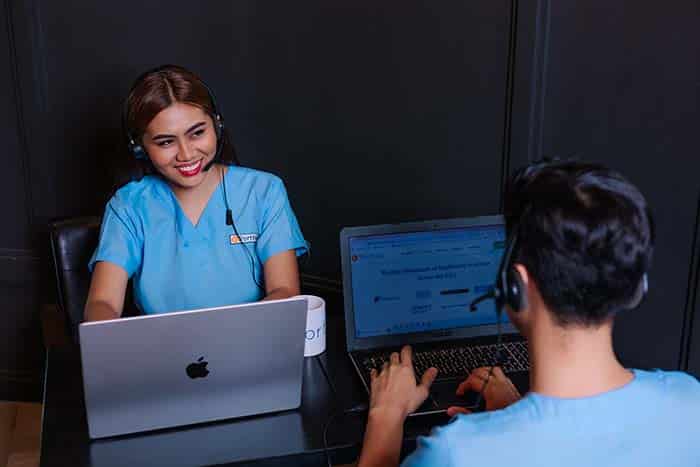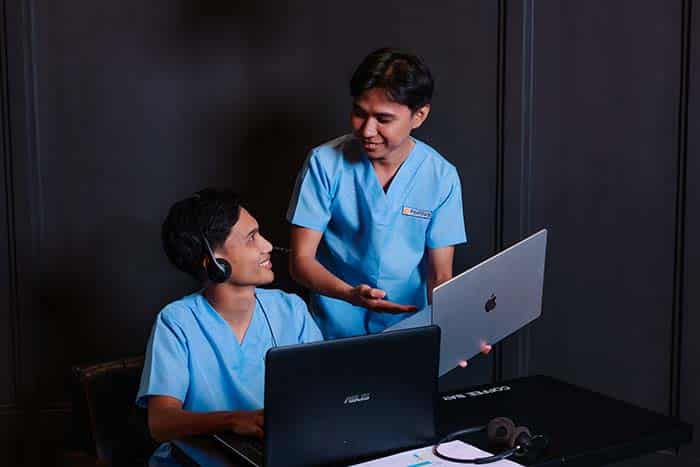Virtual Receptionist Healthcare for Medical Practice Growth
Cut costs, boost patient satisfaction, and never miss a call—get started with virtual receptionist healthcare now.
How Can Prior Authorization Remote Help Your Practice?
See how Portiva is making a real difference in medical practices through our clients’ experiences. Watch this short video to see the impact for yourself, and let’s talk about how we can help streamline your operations and improve patient care today!
Table of Contents
In today’s fast-paced healthcare environment, efficient communication and streamlined administrative support are more crucial than ever. Patients expect fast responses, timely appointments, and friendly service. However, many medical practices are overwhelmed with daily tasks like answering phones, verifying medical coverage, and scheduling appointments. This is where a virtual receptionist healthcare solution steps in—offering a cost-effective, HIPAA regulations compliance alternative to traditional front desk staffing.
A virtual medical receptionist can help clinical practice reduce workload, improve patient interaction, and boost overall efficiency without the high cost of in-house staff. Many practices also consider pairing these solutions with a healthcare answering service to ensure round-the-clock coverage for incoming patient inquiries and inquiries.
What Is a Virtual Medical Receptionist?
A virtual medical receptionist is a remote professional trained to handle front desk operations for medical professionals. These professionals manage everything from answering patient phone inquiries and booking appointments to insurance verification and handling prescription refills—all from a remote location.
Unlike an in-house receptionist, a medical virtual receptionist works online using specialized software and secure communication platforms. They’re trained in healthcare protocols, understand HIPAA adherence, and are skilled in delivering a positive patient experience.
Why Healthcare Practices Are Shifting to Virtual Receptionists
1. Cost-Effective Administrative Support
Hiring full-time on-site staff can be expensive. Salaries, benefits, office space, and turnover costs add up quickly. In contrast, a virtual receptionist offers a cost-effective solution with no overhead—just reliable support at a fraction of the cost. Practices typically save up to 60% in staffing expenses by using virtual assistants.
2. 24/7 Patient Communication
Patients often call outside office hours or when staff is unavailable. A healthcare answering service guarantees that every incoming call is answered by a live person, not a voicemail, ensuring patients feel heard and supported. This creates a seamless patient experience and minimizes missed opportunities for the practice.
3. Improved Patient Satisfaction
A dedicated virtual receptionist ensures that patient phone calls are answered promptly, questions are handled with care, and appointment scheduling is smooth. Quick, professional responses lead to better patient satisfaction and loyalty.
4. Focus on Treating Patients
With a virtual medical receptionist service handling the administrative tasks, doctors and medical staff can spend more time doing what they do best—treating patients. Delegating non-clinical duties boosts productivity and lowers burnout among healthcare professionals.
5. Scalability for Growing Practices
As your medical office grows, so does your need for patient communication and front desk operations. Virtual medical receptionists scale easily with your practice without the hassle of hiring, onboarding, or increasing office space.
Key Responsibilities of a Virtual Medical Receptionist
A medical office virtual receptionist takes on multiple administrative duties to ensure your clinical practice runs smoothly:
- Handle incoming calls with professionalism and empathy
- Schedule appointments and manage calendars
- Verify medical insurance and collect patient data
- Manage patient inquiries through phone, email, or live chat
- Support prescription refills and coordinate with pharmacies
- Perform clerical tasks like record updates and documentation
- Utilize tailored software for secure data handling
- Ensure HIPAA-aligned protocols in all communications
These tasks are managed efficiently to ensure seamless communication between the practice and its patients.
What Our Clients Say About Us!
Discover how our dedicated clients have achieved their goals and transformed their businesses with our expert solutions. Join the ranks of satisfied customers and experience the difference for yourself.
Boost your Efficiency with
Portiva's Virtual Medical Assistant Services
Portiva’s Virtual Medical Assistant Services help healthcare providers streamline administrative tasks, improve efficiency, and enhance patient care all while reducing workload and costs.
Medical Assistant
Insurance Verification
Medical Receptionist
Prior Authorization
Medical Scribe
Dental Assistant
Medical Transcription
Executive Assistant
Medical Billing
Medical Billing
How Virtual Medical Receptionists Enhance the Patient Experience
Prompt Response to Medical calls
When patients call, they want immediate assistance. Delays can frustrate them or lead to negative reviews. Medical virtual receptionists are trained to answer calls promptly and handle patient interactions with care, ensuring the patient feels heard and valued.
Personalized Appointment Scheduling
Online receptionists use smart scheduling tools to ensure appointment scheduling aligns with provider availability and reduces no-shows. They also send reminders and confirmations, helping keep the provider and the patient on track.
HIPAA-Compliant Service Quality
Virtual medical receptionist services are designed with HIPAA compliance in mind. All communication channels—calls, emails, and messages—are encrypted and monitored to protect patient information and medical records.
Clear, Friendly Communication
Possessing excellent communication skills, virtual front desk assistants represent your healthcare practice with professionalism. From answering service calls to guiding new patients, they maintain your brand’s tone and reputation.
Who Can Benefit from Virtual Receptionist Healthcare Services?
Virtual medical receptionists are ideal for:
- Private physicians and solo medical practices
- Specialty clinics like dermatology, cardiology, or rheumatology
- Behavioral and mental health providers
- Dental and orthodontic offices
- Physical therapy and chiropractic care
- Telehealth providers and remote healthcare professionals
Even large medical offices can use virtual medical receptionist services to handle overflow during busy hours or after-hours calls.
Core Benefits of Using Virtual Medical Receptionists
| Feature | Benefit |
|---|---|
| 24/7 availability | Patients can reach your office any time |
| HIPAA compliant | Patient data is always protected |
| Cost savings | Reduce costs on salaries and benefits |
| Better patient service | Improve responsiveness and satisfaction |
| Skills | Administrative tasks responsibilities, patient communication |
| Scalable support | Add or reduce coverage as needed |
| Trained professionals | Skilled in medical terminology and systems | Seamless integration | Works with your current EHR or PMS |
| Reliable coverage | No sick days, vacations, or turnover issues |
Key Differences Between Clinical and General Medical Assistants
| Aspect | Virtual Receptionist | In-House Receptionist |
|---|---|---|
| Coast | Low monthly rate | High salary & benefitsl |
| Availability | 24/7 or custom hours | Office hours only |
| Scalability | Easily adjustable | Limited by hiring |
| Space | No physical space needed | Requires desk/office |
| Redundancy | Always staffed | Affected by leave/sick days |
| Coverage | Supports multiple roles | One person per role |
Many physicians and staff reduce costs by switching to a virtual medical office receptionist, avoid staff shortages, and maintain highpatient journey.
Real-Life Use Case: How a Medical Office Improved Efficiency
Dr. L, a family medicine physician in Dallas, struggled with high call volumes, patient complaints about long hold times, and an overwhelmed front desk. By outsourcing to a virtual receptionist healthcare provider, Dr. L reduced missed calls by 80%, improved appointment scheduling accuracy, and saved $3,000/month in staffing costs. Patient reviews mentioned faster service and better communication.
Top Qualities to Look for in a Virtual Medical Receptionist
When choosing a provider, prioritize:
- Healthcare experience and medical knowledge
- HIPAA compliance certification
- Ability to handle calls from patients with empathy
- Skills in insurance verification and basic billing
- Proficiency in using your scheduling or EHR software
- Clear and professional communication skills
- Flexibility to support your medical specialty
- Strong references and reputation in the healthcare industry
Partnering with a high-quality service ensures your digital receptionists becomes an extension of your team—not just an outsourced solution.
Why Virtual Receptionists Are the Future of Healthcare Front Desk
The modern healthcare environment demands agility, responsiveness, and cost-efficiency. Whether you’re a new provider or managing a bustling clinic, digital receptionist services let you:
- Answer every patient call promptly
- Maintain HIPAA-compliant administrative support
- Optimize appointment scheduling and reduce no-shows
- Handle insurance verification and patient data entry accurately
- Deliver a consistent and caring patient experience
- Scale without the burden of physical expansion
As medical practices continue to navigate staffing challenges and rising patient expectations, the shift toward remote workers like virtual medical receptionists is more than a trend—it’s a proven strategy for success.
Final Thoughts: Elevate Your Practice with a Virtual Receptionist
In the competitive world of healthcare, the patient’s first impression often begins with a phone call. Make that experience seamless, friendly, and professional with a virtual medical receptionist.
With the help of a professional healthcare answering service, your practice can ensure no patient call goes unanswered even during off-hours.
Ready to boost your service quality and patient satisfaction? Partner with a HIPAA-compliant virtual customer service reps healthcare service today.
The US Health Insurance Portability and Accountability Act (HIPAA), enacted in 1996, was established to safeguard patient privacy and secure health information.
(Peter F. Edemekong; Pavan Annamaraju; Muriam Afzal; Micelle J. Haydel.)
Get in touch with our team at portiva.com for a free consultation and see how easy it is to transform your front desk operations—without the overhead.




